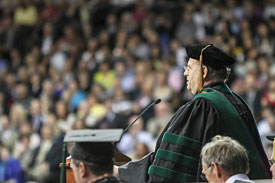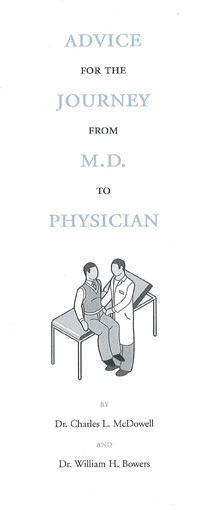In May, I stood on the stage before the Class of 2012. They were bright and clever in the classroom, and adept at mastering clinical skills. But most of all, they had taken to heart the concept of humanism in medicine. The principles their faculty shared through programs such as Project HEART — like treating patients with respect and empathy — came naturally to them.

The Dean of Medicine, Jerry Strauss, M.D., Ph.D., addresses the Class of 2012 at the medical school’s convocation ceremony.
So with their diploma, we offered the Class of 2012 a last reminder of those principles, which we hope all our students will embrace. It was in the form of a 10-page pamphlet entitled “Advice for the Journey from M.D. to Physician.” It was brought to our attention by Walter Lawrence, M.D., professor emeritus of surgery. He recommended it because it offers sound advice on the nuts and bolts of being a physician — some timeless teachings.
The authors are Charles L. McDowell, M.D., and William H. Bowers, M.D., pioneers in upper extremity surgery and longtime friends. They are now retired from private practice, but continue as clinical faculty in our Department of Orthopaedic Surgery and in their responsibilities for patients and teaching at the McGuire Veterans Affairs Medical Center. Together, they have more than 90 years of collective experience. Some of that wisdom has been passed on through journal articles and textbooks, and they’ve been invited to lecture at elite medical schools in the U.S. and Europe.
A few years ago, they decided to collect their views on what it takes to grow into a successful physician. Dr. McDowell says their goal was to encourage young physicians to keep studying, and take pleasure in the profession they had worked so hard to enter. They shared their early drafts with peers who told them they should write a book. But they felt strongly that their target audience would never read a whole book on this topic. Instead, they distilled it down so that it could be read in one sitting.
The pamphlet is full of wisdom drawn from their collective experiences, and from their personal role models. In fact, first among their recommendations for newly minted M.D.s is to find their own role models to emulate. There’s also practical advice on listening to patients, eliciting detailed histories and sharpening the powers of observation — skills that are vital for forming an accurate diagnosis. It is a compilation of many of the issues that we talk about during a student’s training, but never have articulated in a concise and approachable form.
Drs. McDowell and Bowers were very generous to donate copies of their pamphlet for us to share with our graduating students. Chris Woleben, M.D., a member of the medical school’s Class of 1997, is now the School of Medicine’s Associate Dean of Student Affairs. In his remarks at our convocation ceremony, he suggested the graduates read it the night before they begin residency training. And while I do hope they’ll get a good night’s sleep on June 30, I also hope they’ll stay up late enough to follow that piece of advice.

In their pamphlet, Drs. McDowell and Bowers include nearly 20 reading recommendations. They note: “The list is an introduction to the literature of human striving, observation and humor with an emphasis upon the doctor’s experience.” The list includes:
- Aequanimitas and A Way of Life, Sir William Osler (essays on maturation of physicians)
- The Citadel, A. J. Cronin (the story of a young physician under external pressures; a novel)
- Arrowsmith, Sinclair Lewis (a story of a physician dealing with family and professional choices; a novel)
- Middlemarch, George Eliot (a novel)
- Tender is the Night, F. Scott Fitzgerald (a novel)
- Ten Fingers of God: The Life and Work of Paul Brand, D. C. Wilson (biography)
- The Cry and the Covenant, Morton Thompson (fictionalized story of Ignatz Semmelweis’ struggles with science and peers in the early days of understanding the true nature of infection)
- How Doctors Think, Jerome Groopman, M.D.
- When All the World Was Young, Ferroll Sams, M.D. (humorous experiences of maturation by a general surgeon)
- Lives of a Cell: Notes of a Biology Watcher, Louis Thomas
- The Death of Ivan Ilych, Leo Tolstoy (an example of remarkable skills of observation; a novella)
- An Enemy of the People, Henrik Ibsen (a principled physician in a serious dilemma; a play)
- Ozymandias, P. B. Shelley (a poem describing overweening hubris)
- The Love Song of J. Alfred Prufrock, T. S. Eliot (a poem describing the regrets of a man who did not grasp an essential meaning of life)
- On Doctoring, 3rd Edition, R. Reynolds, M.D. and J. Stone, M.D., 2001 (compendium of stories and poems)
- Medicine in Quotations, 2nd Edition, E. J. Huth and T. J. Murray, American College of Physicians, 2006
- Bartlett’s Familiar Medical Quotations, Maurice Strauss, Little Brown, 1988
- The Hospital, movie, black comedy starring George C. Scott (performance nominated for Academy Award)

Jerome F. Strauss, III, M.D., Ph.D.
Dean, VCU School of Medicine
Executive Vice President for Medical Affairs, VCU Health System